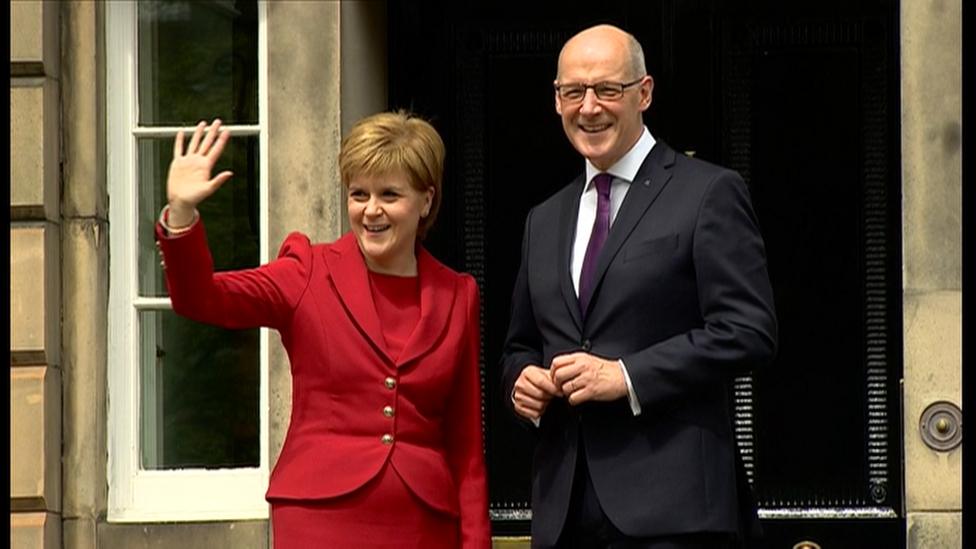Sturgeon announces school reform summit as part of 'bold' education plan
- Published
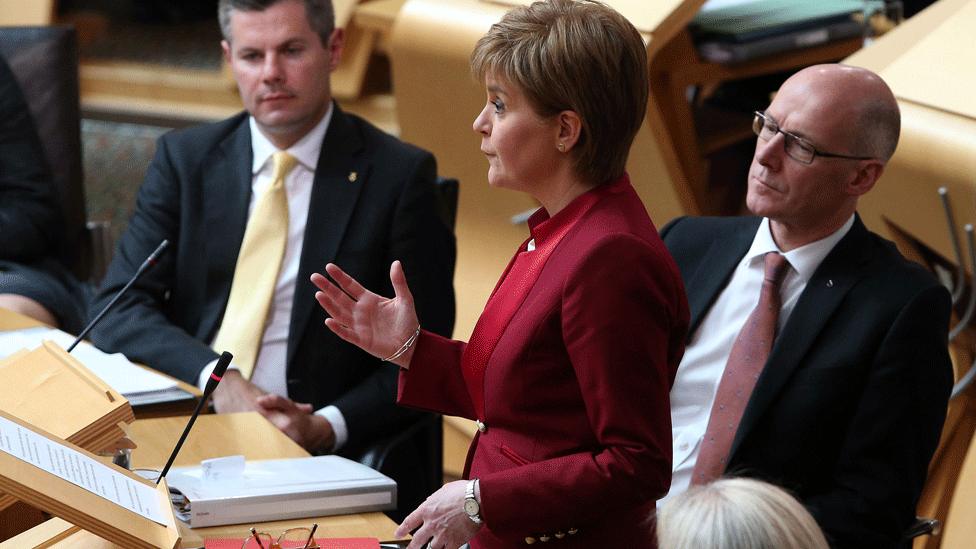
The Scottish government is to convene a "major summit" of education leaders in a bid to close the attainment gap between schools.
Nicola Sturgeon underlined education and the economy as her top priorities in a speech at Holyrood.
The first minister said her ministers aimed for "real and lasting progress towards true equality of opportunity".
Opposition parties said they would work with the government on education, but urged "genuine reform".
MSPs will also vote later in the day on a motion to extend future sessions of First Minister's Questions to 45 minutes.
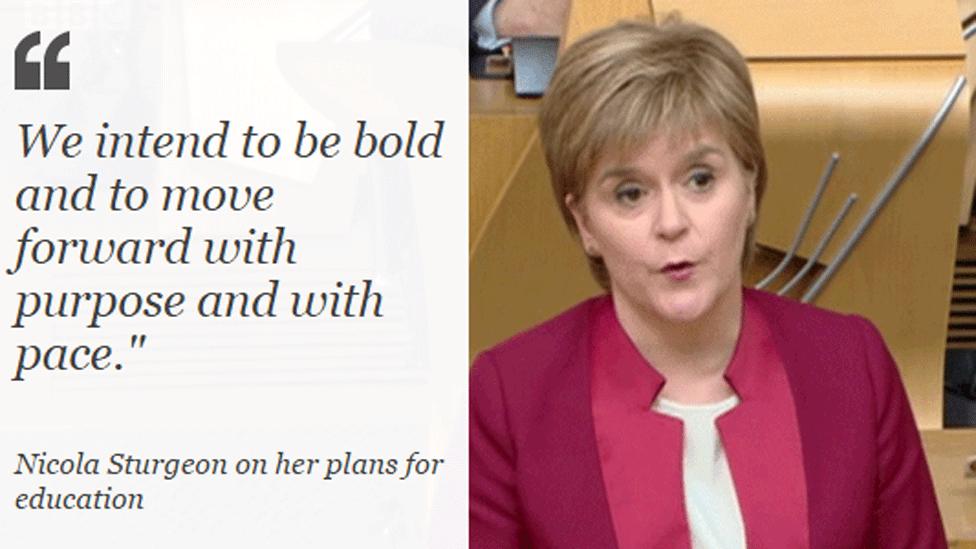
The SNP has formed a minority administration in the Scottish Parliament after returning 63 MSPs in the elections earlier in the month.
The first minister has reshuffled her cabinet with her key priorities in mind, introducing separate finance and economy portfolios and shifting her deputy John Swinney to the education brief.
As one of its first actions, the cabinet has established an international council of schools experts to advise the government on education policy.
During the election campaign, Ms Sturgeon repeatedly underlined education as the issue that she wanted to be "judged on" during the coming Holyrood term.

Analysis by Brian Taylor, BBC Scotland political editor
The astute among you - and that includes all readers of these musings, ipso facto - will have spotted the gap. No place for the Conservatives.
That fits Nicola Sturgeon's thinking - which is to the effect that the Tories may yet be squeezed out in a parliament where, she argues, there is potentially "a clear progressive majority".
Indeed, she went further, arguing that cross-party opposition could be assembled to key UK government policies such as the renewal of Trident.
So were those other parties in the supposed progressive consensus grateful for the name checks from the first minister? Friends, they were not.

In her speech, Ms Sturgeon said work to close the attainment gap between schools would be "the mission, not just of this government or even this parliament, but of the country as a whole".
She said: "Over the next few months, we will convene a major summit on school reform and raising attainment.
"It will bring together all the key stakeholders in education to look at what each of us can do to help raise attainment and how collectively we drive this work forward. We will invite party leaders and education spokespeople to attend."
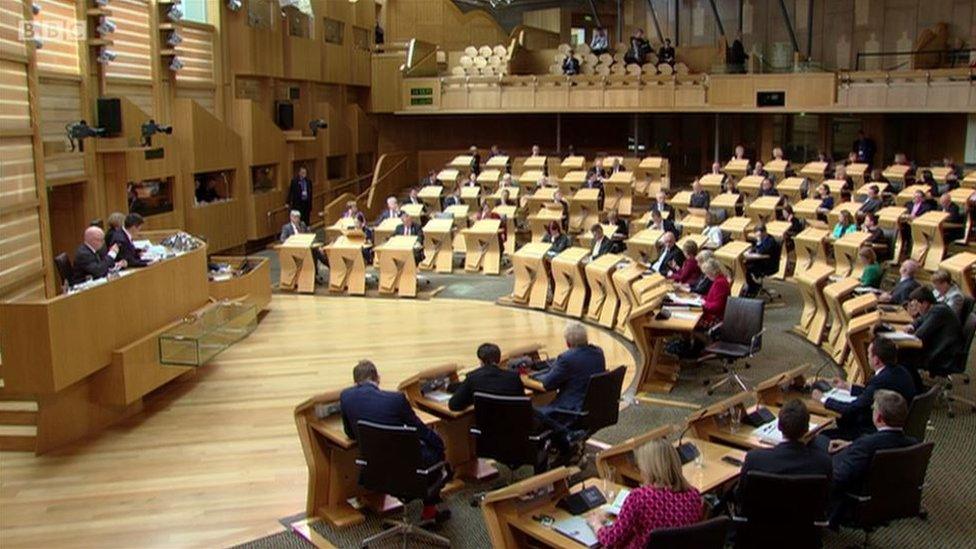
Opposition parties were given the chance to respond to Ms Sturgeon's speech
She also said the expansion of childcare would be "our most important infrastructure project of this parliament".
Ms Sturgeon said she would "work hard to build consensus and partnership" at Holyrood, outlining policies she would explore from the Labour, Lib Dem and Green election manifestos.
Other policies set out by the first minister include:
Publishing a delivery plan to improve Scottish education
Reappointing an independent poverty advisor, and implement all the recommendations made in the last term
A new target of reducing greenhouse gas emissions by 50% by 2020
Setting out a timetable to ensure that every household has broadband access by 2021
Building 50,000 new affordable houses, including 35,000 for social rent
Introducing a bill to establish a Scottish social security agency within the first year of parliament
Providing a "baby box" for every child born in Scotland
Ruth Davidson, whose Conservatives overtook Labour to become Holyrood's second largest party in the election, got the first chance to respond.
Ms Davidson said her party would offer "forensic" scrutiny of Ms Sturgeon's government, rather than "frenzied gnashing of teeth".
Confirming that she would attend the summit being proposed, the Tory leader said parliament should agree that "the status quo is no longer an option" when it comes to education, urging "genuine reform".
She also warned her opponents against backing tax rises, saying parties which had lost MSPs in the election should not "charge up the valley of death".
Ms Davidson attacked the government's "failure" over payments to farmers, and urged them to rethink the "chaotic" plan to introduce a named person responsible for each young person in Scotland.
Nicola Sturgeon says her government will work with other political parties in "a bold and progressive" Parliament to benefit Scotland
Ruth Davidson calls for an end to SNP "middle-class giveaways" at the expense of the further education sector
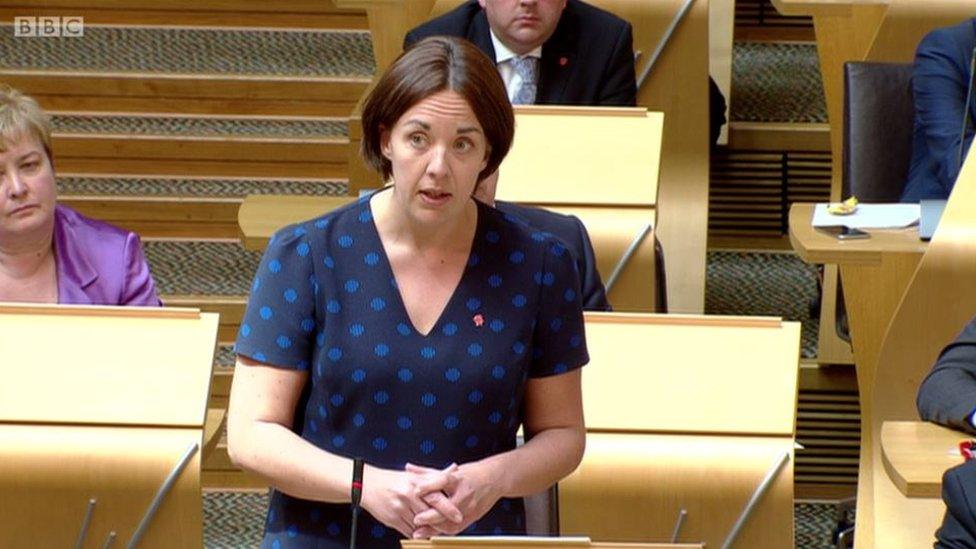
Ms Dugdale said the SNP should work with "progresive" parties like Labour instead of the Tories
Labour leader Kezia Dugdale spoke after Ms Davidson, and also underlined education as her top priority.
Ms Dugdale issued a plea to the SNP government, to work with "progressive" parties of the left like hers rather than the Conservatives.
She also criticised them as "cynical" for speaking out against austerity at Westminster while imposing cuts in Scotland - something she called a dereliction of duty.
Green co-convenor Patrick Harvie spoke fourth after his party moved into fourth place at the Holyrood election, overtaking the Lib Dems.
He said his party would seek to be "constructive and challenging", and called for bolder action on areas including climate change, sustainable transport and the economy.
'Accept lost majority'
Lib Dem leader Willie Rennie also called on the SNP to be more ambitious.
He said Ms Sturgeon's party needed to accept that they had lost their majority at the election, and "reach out" properly to opposition parties.
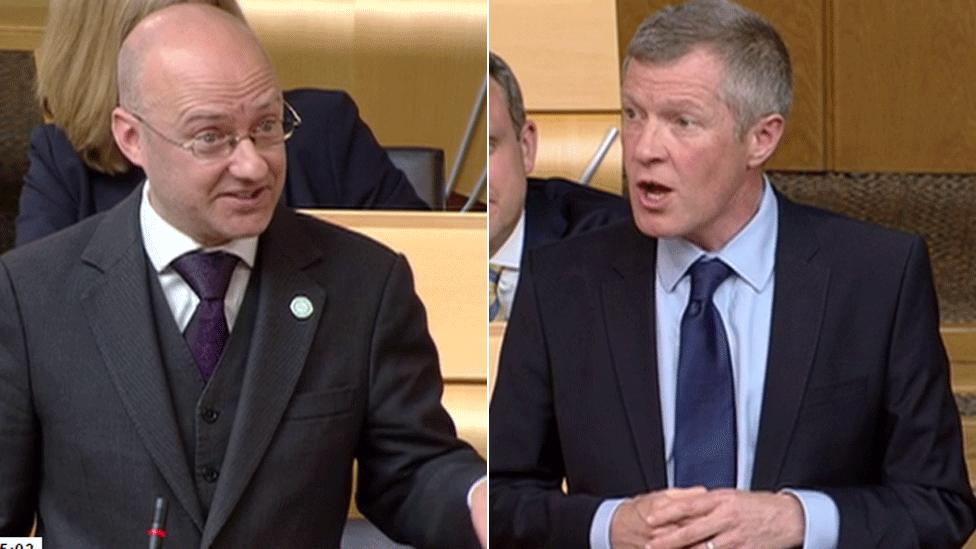
Scottish Green Party leader Patrick Harvie and Scottish Liberal Democrat Party leader Willie Rennie responded to the government's plans
The debate, titled Taking Scotland Forward, will not conclude on Wednesday, but will be continued on Thursday afternoon after a debate on the European Union referendum led by Culture Secretary Fiona Hyslop.
Further debates on Taking Scotland Forward are planned for each sitting day the following week, focusing on issues from the economy to the environment and land reform.
- Published24 May 2016
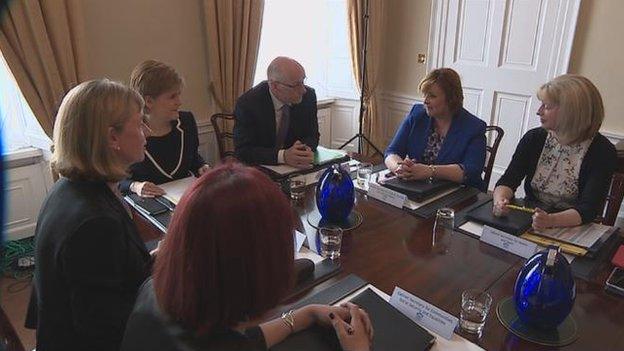
- Published18 May 2016
